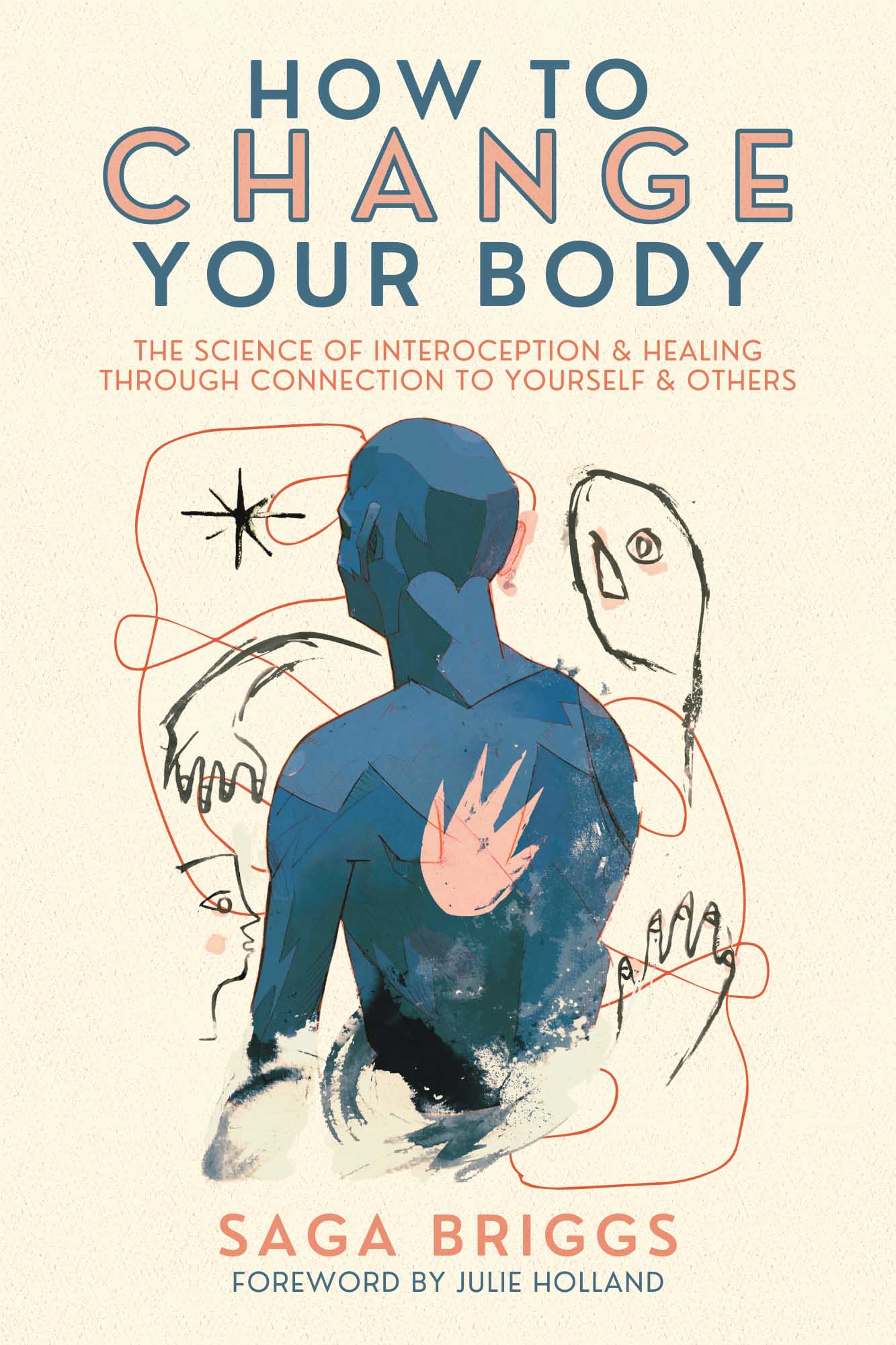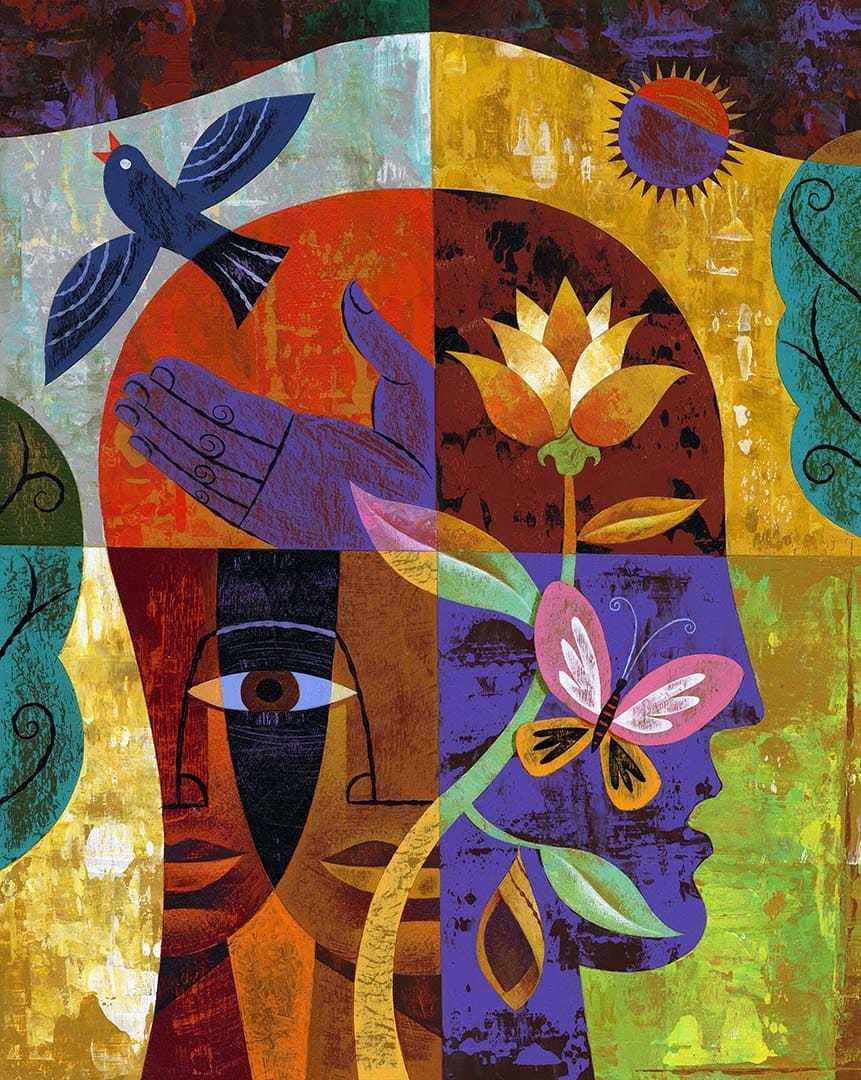In our daily lives, we constantly receive sensory information from our environment. Most people are familiar with the classic five senses—sight, sound, touch, taste, and smell—but there’s another sense known as “interoception” that’s not as commonly discussed. Interoception is at the crux of our internal bodily sensations and plays a pivotal role in how we perceive and interact with the world. Adding another layer of depth to the concept of interoception is the theory of predictive coding, a fundamental framework of brain function. When we merge these concepts with insights from research into psychedelic-assisted therapy, we can cultivate a deeper sense of connection, improving our relationships with ourselves and others.
What is Interoception?
Interoception is our ability to sense, interpret, and integrate internal bodily sensations. It’s the reason we feel hunger, thirst, and the need to breathe. Author of the recently published book How to Change Your Body: The Science of Interoception and Healing through Connection to Yourself and Others, Saga Briggs, explains that “…interoception is like mindfulness for the body—it’s what allows us to be aware of our own well-being. And it’s unique for everyone, although it’s generalizable enough that we can often understand each other’s descriptions of interoceptive sensations.”
Interoception helps us be aware of our heart rate, respiratory rate, and even the sensations in our gut. All these internal signals provide feedback to the brain about the state of our body, playing a crucial role in maintaining physiological homeostasis. Beyond just physiological sensations, interoception is closely connected with our emotions. Ever felt “butterflies in your stomach” when nervous, or a “heavy heart” when sad? These emotional states manifest as tangible bodily sensations through the interoceptive system.
Highlighting this connection between physiological sensations and emotions, Briggs writes, “You may have noticed that emotional and physical feelings are part of the same list. That’s because the interoceptive process that allows us to sense the state of our internal organs also allows us to experience and regulate emotion.”
According to neuroscientific research, it has been found that body sensing and emotion processing take part in the same part of the brain, the insular cortex. Briggs explains, “We tend to think that signals for emotions like joy or anger have nothing to do with signals for body processes like hunger and thirst, but this is a mistake. They are part of the same interoceptive system. Body and emotion are inseparable.”
Predictive Coding: A Brief Overview
Adding to the notion of interoception is the theory of predictive coding, one of the most commonly accepted accounts of human brain function. The brain is an incredible prediction machine. Instead of passively receiving information, it actively predicts what’s coming next and generates a reliable model of the world based on past experiences. Predictive coding suggests that the brain constantly creates a model of the world to forecast sensory input.
“According to this theory, the brain creates models for our perception, concepts, and feelings based on experience, and anything falling outside these models results in a ‘prediction error,’ which is then either updated by new information (adapting to the temperature of a hot bath) or by prior beliefs (the feeling of having a real limb where one is missing, as in phantom limb syndrome),” writes Briggs. “Although it’s meant to serve an adaptive function, too much prediction in the wrong direction can trap us into destructive belief systems and habits, including substance abuse.”
The Interoceptive System, Predictive Coding, and Psychedelic Research
Our understanding of how our early life experiences shape our connection to our own bodily sensations – or interoception – has expanded over the years. Briggs highlights the work of Dr. Kristina Oldroyd, at Utah Valley University, which calls attention to the significant impact of early social experiences on the development of interoception. As our caregivers recognize and validate our bodily experiences during childhood, our sense of interoception becomes more precise. However, if these experiences are denied or devalued, our connection with our own bodily signals can become distorted. This connection with our bodily signals, known as interoceptive awareness, plays a crucial role in our emotional and mental well-being.
Psychedelics offer unique insights into the mechanics of our brain. Instead of merely amplifying brain activity, they alter the predictive filters, allowing us to experience the world around us in a richer, more detailed manner. This alteration in perception can be beneficial, especially when dealing with mental health conditions such as depression. Depression often traps individuals in a loop of negative self-perception and rumination.
Introducing psychedelics into the system can disrupt this cycle, allowing for new patterns of thought, and pulling individuals out of their mental, emotional, and physical ruts.
“Psychedelic science offers some of the best evidence for predictive coding by showing us what happens when it is compromised,” writes Briggs. “Instead of simply increasing brain activity, substances like psilocybin and LSD loosen the predictive filter that’s normally in place, allowing us to perceive other possibilities—for example, being arrested by the incredibly vibrant detail of a daffodil rather than passing it off as just another flower in the garden.” Furthermore, research emphasizes the close interrelation of mind and body, revealing that our feelings about life and our well-being are deeply connected with our bodily sensations.
This intimate connection between mind, body, and society challenges the traditional labels and understanding of mental illness. “Not only is the mind inseparable from the body, but the body is inseparable from social relationships,” shares Briggs. “Human afflictions are biopsychosocial, closely tied to emotion states arising from relational bodies. This is something long known by clinicians and scientists, but still the notion of a ‘chemical imbalance’ dominates narratives of illness, just as the meaning of thought patterns tends to outweigh the significance of bodily signals in psychiatric settings.”
Rather, Briggs suggests that most illnesses are failures of connection to ourselves, our bodies, and others, positing that psychedelics help us “expand the social-embodied possibility space” by improving interoceptive awareness and breaking our deeply entrenched predictive coding.
Tools for Cultivating Interoceptive Awareness
In Saga Briggs’ How to Change Your Body the profound connections between our internal bodily sensations, our perceptions, and the world of psychedelics are masterfully explored. This deep dive into our internal navigation systems uncovers how they influence not only our physiological responses but also our emotional states, behaviors, and connections.
Briggs suggests some helpful tools in order to cultivate a greater sense of interoceptive awareness including focusing attention on the body through practices such as rhythmic breathing, body scans, physical activities such as yoga, respiratory practices such as slow, deep breathing, somatic practices such as Hakomi Experiential Psychotherapy or the Feldenkrais Method, as well as social justice approaches which understand that interoception might differ for those with marginalized bodies such as Nkem Ndefo’s Resilience Toolkit.
Ultimately, as Briggs illuminates, the journey to self-awareness and healing is one of reconnecting with our bodies, breaking away from restrictive patterns, and expanding our understanding of our own possibility space.
Artwork by Rafael López.

Emerging from a written article for the MIND European Foundation for Psychedelic Science, this book combines expert interviews from leading institutions around the world such as Johns Hopkins and Oxford, independent research and lived experience, connecting the dots of three timely themes: interoception, psychedelics, and mental health.

